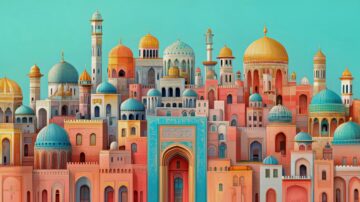Islam a secure refuge for humanity comes at a time when crises besiege our Arab and Islamic societies, tearing apart bonds in favor of extremist identities and deadly racism. In an age dominated by absurdity and moral fluidity, we urgently need to rebuild a comprehensive civilizational vision—and Islam provides the creed, worldview, and value system at the core of that revival
Islam’s Comprehensive Vision of the Universe and Life
What distinguishes Islam from other religions, philosophies, and ideologies is its all-encompassing vision of the universe, life, and humanity—a vision that unites the immutable and the changing, the unseen and the manifest, natural belonging and ethical jurisprudence. This vision does not merely create a religious consciousness; it establishes a profound existential affiliation that connects the individual to God and grants them dignity and responsibility within the cosmos.
In the Islamic worldview, human beings are not aimless passersby but are khalīfah (vicegerents) entrusted with a mission: to cultivate the earth according to a legislative and moral framework that balances spirit and matter, self and other. When every human action is aligned with the intentions and values set forth by Islam, it becomes an act of worship, elevating human life from mere consumption or instinctive reaction to a life imbued with purpose and meaning.
Restoring Meaning: Islam’s Answer to Value Fluidity
Our societies today are mired in a “value fluidity” that has stripped them of any fixed referents. As grand sources of authority have waned, life has become a free-for-all playground, where competing ideologies clash, affiliations fracture, and individuals are reduced to mere numbers, consumers, or followers. This fluidity stems from societies severing ties with their authentic civilizational reference points and importing alien intellectual models that carry “deadly ideas.”
In this context, Islam emerges as a refuge and a guiding authority capable of rebuilding meaning, anchoring belonging, and directing human energy toward construction rather than destruction. Instead of being dissolved into one’s sect, ethnicity, or political affiliation, Islam restores a universal identity: a connection to one Creator, one ultimate purpose, and a bond of human brotherhood that transcends all artificial boundaries.
Embracing Diversity under Islamic Principles
One of Islam’s greatest contributions in our fractured times is its capacity to accommodate difference without turning it into conflict. The Qur’an affirms:
“And if your Lord had willed, He would have made mankind a single community; but they will not cease to differ…”
(Hud 11:118)
Yet this diversity is not an invitation to violence; rather, it becomes a rich human experience that broadens the mind, expands horizons, and cements cooperation instead of exclusion. Under Islam’s vision, a person is not defined by their color, language, or sect but by their deeds and their contribution to the collective project of building and progress. This principle lays the foundation for a just state, a cohesive society, and an individual filled with meaning. Reviving the Islamic civilizational project thus requires more than repeating rhetoric—it demands awakening the unifying spirit that turns diversity into a strength rather than a burden.
From Passive Consumption to Active Stewardship
Islam’s cosmic and life vision transforms the individual into an active agent, not a passive recipient. One is entrusted with the amānah (trust), responsible and capable—not lazy without accountability, free yet bound by divine balance. The Islamic concept of successional stewardship on earth is not a metaphysical abstraction but a practical mission that channels all human energies toward a noble goal—reconciling bodily needs with spiritual aspirations and striving to realize one’s full humanity not through isolation but through engagement and giving.
When a Muslim embraces this stewardship, they transcend preoccupation with the trivial and enter vast horizons of awareness and efficacy. Education, work, social relations, economy, and politics all become arenas for realizing meaning, not merely tools for survival or domination.
True Liberation Begins with a Renewed Vision
Our societies have repeatedly failed to rise because their efforts did not spring from a firm reference point or a strong inner center, nor did they adopt an inclusive vision that addresses human needs and aspirations. Continuous experimentation outside the Islamic reference deepened dependency rather than overcoming it. Political, social, educational, cultural, and economic systems imported external models without producing their own authentic project—resulting in injustice, fractured identity, and pervasive confusion.
True liberation does not begin with piecemeal economic, political, cultural, or social solutions lacking a coherent vision. It begins by liberating our perspective—rebuilding our relationship with self, cosmos, and others through a framework that frees the individual from servitude to anything besides God, connecting them to a boundless horizon that transcends the transient present toward the supreme purpose Islam sets: to elevate humanity from the worship of creation to the worship of the Creator, from the tyranny of religions to the justice of Islam, and from the narrowness of this world to the vastness of this world and the Hereafter.
Conclusion: Islam as the Lever of Renewal
Today we face an existential choice—not merely political or cultural. We must either reorder our priorities and build our renaissance upon our authentic Islamic vision—which grants humanity its dignity, society its unity, and the state its civilizational project—or remain trapped in a futile cycle of experimentation, division, and dependency.
Islam is not merely a refuge from danger; it is the compass of salvation, the springboard of renewal, and a spiritual and civilizational rescue plan all at once. It provides what today’s world lacks: meaning, dignity, belonging, and responsibility. Without it, we remain shadows of others, repeating failure under new names.

